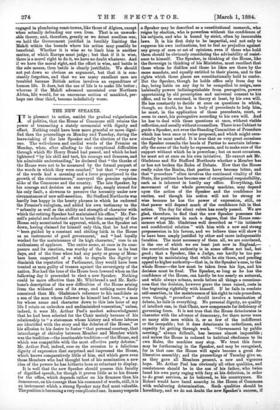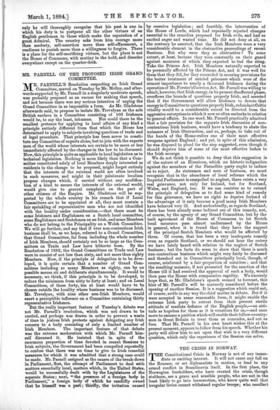THE NEW SPEAKER.
IT is pleasant to notice, amidst the gradual vulgarisation of politics, that the House of Commons still retains the power of transacting a stately ceremonial with dignity and effect. Nothing could have been more graceful or more digni- fied than the proceedings on Monday and Tuesday, during the leave-taking of the late Speaker and the election of the new one. The well-chosen and cordial words of the Premier on Monday, when, after alluding to the exceptional difficulties through which Sir Henry Brand had passed, and which he had lightened " by his skill and tact, his courage and firmness, and his admirable understanding," he declared that "the thanks of the House were not to be measured by the formal purport of the words in which they were couched," but that " every one of the words had a meaning and a force proportioned to the growth of the circumstances," conveyed the genuine opinion alike of the Commons and the country. The late Speaker, by his courage and decision on one great day, amply atoned for his only fault, a slowness to perceive the necessity under new circumstances of new self-assertion. Sir Stafford Northcote was hardly less happy in the hearty phrases in which he endorsed the Premier's eulogium, and added his own testimony to the " urbanity as well as the ability and strength of character with which the retiring Speaker had maintained his office." Mr. Par- nell's painful and reluctant effort to break the unanimity of the House only accentuated its approval, which, as the Speaker sat down, having claimed for himself only this, that he had ever " been guided by a constant and abiding faith in the House as an instrument of good government," and " had loyally worked for the maintenance of its high character," rose to an enthusiasm of applause. The entire scene, at once in its com- posure and its emotion, was worthy of the House in its best days, and of the time when had any party or group of Mem- bers been suspected of a wish to degrade the dignity or diminish the reputation of Parliament, they would have been treated as men guilty of treason against the sovereignty of the nation. Nor had the tone of the House been lowered when on the following day it proceeded to elect a new Speaker. Nothing could be more effective than Mr. Whitbread's and Mr. Rath- bone's description of the new difficulties of the House arising from the widened area of its sway, and nothing more finely conceived than Mr. Gladstone's reference to his candidate as a son of the man whose follower he himself had been, " a man for whose name and character down to this late hour of my life I retain an unbroken and undiminished veneration," unless, indeed, it were Mr. Arthur Peel's modest acknowledgment that he had been selected for the Chair mainly because of his relationship to a statesman whose history and whose labours are identified with the story and the debates of the House," or his allusion to his desire to foster "that personal courtesy, that interchange of chivalry between Member and Member which was the tradition—the inestimable tradition—of the House, and which was compatible with the most effective party debates." Mr. Arthur Peel, indeed, rose on the occasion to a felicitous dignity of expression that surprised and impressed the House, which knows comparatively little of him, and which gave even those Members who had thought best of his nomination a new idea of the powers he has hitherto been so reluctant to display.
It is well that the new Speaker should possess this faculty of dignified speech, for though it proves little as to his fitness for the office, which depends rather on his firmness than his demeanour, on his courage than his command of words, still, it is an instrument which a strong Speaker may find most valuable. The position is becoming a very complicated one. In many respects
a Speaker may be described as a constitutional monarch, who reigns by election, who is powerless without the confidence of his subjects, and who is bound by strict, often by inexorable laws. It is his first duty to be impartial, and not only to suppress his own inclinations, but to feel no prejudice against any group of men or set of opinions, even if those who hold them should be obviously considering the advisability of resist- ance to himself. The Speaker, in thinking of the House, like the Sovereign in thinking of his Ministries, must recollect that those whom he dislikes and those he likes are there by the same mandate, and equally entitled to their places, and to the rights which those places are constitutionally held to confer. But the Speaker, though he holds office only from day to day, being liable on any day to be compelled. to resign, uses habitually powers indistinguishable from prerogative, powers appertaining by old prescription and universal consent to his office, and to be exercised, in theory at least, by his own will. He has constantly to decide at once on questions in which, though, no doubt, he has a body of precedents to help him, he must, in the application of those precedents, exert, or seem to exert, his prerogative according to his own will. And he has to deal with those questions at once, without visible reflection, and usually without counsellors. There is no Cabinet to guide a Speaker, not even the Standing Committee of Procedure which has been once or twice proposed, and which might occa- sionally be most useful. It is true that on very great occasions the Speaker consults the heads of Parties to ascertain inform- ally the sense of the body he represents, and to make sure of the support without which he is powerless ; but on most occasions, he must act at once on his own initiative. He cannot ask Mr. Gladstone and Sir Stafford Northcote whether a Member has or has not broken the Rules of Debate. Now that the House really rules the Realm, that parties have become bitter, and that " procedure " often involves the continued vitality of the State, the position has become one of exceptional responsibility, such as is inherent in hardly any office. Everything, the movement of the whole governing machine, may depend upon the action of the Speaker and the confidence he excites, and though his action will not be strong or wise because he has the power of expression, still, on that power will depend much of the confidence felt in that action. The day for silent rulers has nearly passed. We are glad, therefore, to find that the new Speaker possesses the power of expression in such a degree, that the House com- mences what Mr. Gladstone well described as " its intimate and confidential relation " with him with a new and strong prepossession in his favour, and we believe time will show it to have been amply justified by other and more indispensable faculties. The most necessary of them all, we are convinced, is the one of which we see least just now in England,— the conviction that authority is in some offices not bad, but good ; that a Speaker, like a Judge, can hardly be too per- emptory in maintaining that while he sits there, and pending appeal to higher authority—that is, in the Speaker's case, to the whole House—the law must be taken from his lips, and his decision must be final. The Speaker, so long as he has the confidence of the House, can hardly be too nearly an autocrat, and while always urbane, needs before all things a conscious- ness that the decision, however grave the issue raised, rests in the beginning rightfully with himself. If he fails in resolute self-assertion, in the maintenance of his right to rule procedure, even though " procedure " should involve a termination of debate, he fails in everything. No personal dignity, no quality of intellect can, in that Chair, now compensate for deficiency of governing force. It is not true that the House deteriorates in character with the advance of democracy, for there never were so many able men within it, or so few of the indifferent or the incapable ; but it does deteriorate in orderliness, and capacity for getting through work. "Government by public meeting," always difficult, has become almost impossible ; and unless the House is reduced to habitual obedience to its own Rules, the machine may stop. We trust this force may be forthcoming in the Speaker, and may be recognised, for in that case the House will again become a great de- liberative assembly; and the proceedings of Tuesday give us, as they gave all Members present, a new and vigorous hope. Mr. Arthur Peel has obviously all other qualities, and resoluteness should be in the son of his father, who twice faced his own party raging with fury at his defection, in order to do great services, as he believed, to his countrymen. Sir Robert would have faced anarchy in the House of Commons with unfaltering determination. Such qualities should be hereditary, and we do not doubt the new. Speaker's success, if only he will thoroughly recognise that his post is one in which his duty is to postpone all the other virtues of an English gentleman to those which make the reputation of a great Admiral. The country asks from him courage more than modesty, self-assertion more than self-effacement, a readiness to punish more than a willingness to forgive. There is a place for the sell-sacrificing virtues, but the place is not the House of Commons, with mutiny in the hold, and disorder everywhere except on the quarter-deck.



































 Previous page
Previous page